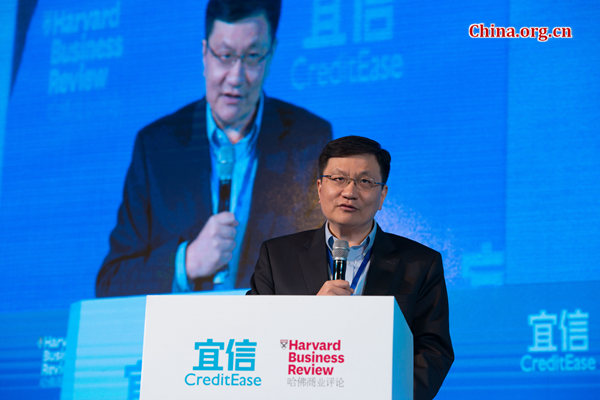CreditEase sticks to inclusive finance
- By Chen Boyuan
 0 Comment(s)
0 Comment(s) Print
Print E-mail China.org.cn, May 30, 2016
E-mail China.org.cn, May 30, 2016
CreditEase, a leading inclusive finance and wealth management company in China, pledged on Sunday that it would continue and expand its inclusive finance services during the company's 10th anniversary.
During the past ten years, CreditEase has tried to offer easy financial services based on an individual entity's credit to small-and-micro enterprises (SMEs), low-income rural households in remote areas and fresh college graduates which represent a niche market traditional financial agencies would not set foot in.
However, its decade-long dedication to inclusive finance has solved "more than half of the uncovered areas of traditional finance. The market of inclusive finance today is as big as traditional finance," asserted Tang Ning, the company's founder and CEO at the company's 10th anniversary celebration, also an occasion that unveiled the report titled "The Practice of Inclusive Finance in China: Technology Drives Forward Innovation."
He defined inclusive finance as a "pioneering, cool, problem-solving and interesting" branch of finance, which would feature "high-level, high-touch, high-potential and high-growth."
The fast growth of inclusive finance in China has been in sync with the rise of the internet economy, during which the government encouraged mass entrepreneurship and intensified poverty-reduction efforts. CreditEase believes that these groups have the potential to thrive as long as they are granted a small assistance fund.
According to the CreditEase report, China has around 19 million SMEs, 51.65 million private industrial or commercial households and 200 million commercial farmers.
"For these people, sometimes the difference between success and failure is a loan of merely tens of thousands of yuan. For some rural households in remote places, it might be 8,000 yuan (US$1.223) or even less," said Tang.
Helping clients build their capabilities, apart from providing small loans, is also what makes inclusive finance different from traditional finance. For example, CreditEase staff members helped train microbusiness owners, working class and agricultural households, and linked actual vocational skills to the importance of keeping good credit; in other words, loans must be paid off on time.
"We taught rural women knitting and embroidery skills, helped fresh college graduates to dock with electronic business platforms, and in extreme cases, we even told some of our loan recipients to separate face towels with towels for other purposes helping them stay sanitary," Tang said.







Go to Forum >>0 Comment(s)